Remember the old Burma Shave signs that used to line our roadways? Jess Mazour and landowners living along the proposed carbon dioxide pipeline route have their own signs that were placed along the road to last month's BBQ and rally in Eldora. The signs are
Later this month, Summit begins its public meetings about the expansion route of its carbon dioxide pipeline. They haven't built the first one and they are already expanding.
Unfortunately, the Iowa Utilities Commission did not reconsider its ruling on Summit's application for a permit for its initial route. . . so we are headed to Polk County court.
Pam Mackey Taylor, Newsletter Editor
What you can do to help the environment
- Mark your calendar for the Summit carbon dioxide pipeline informational meetings near you. They are being held in August and September.
- Put the Sierra Club Annual Meeting on your calendar - October 5, 10:00 to 3:30, Olmsted Center at Drake, in Des Moines and RSVP for the event.
- If you have a private well, have the water tested for nitrates. Contact your county public health department to determine where to take your water for testing.
- Donate to the Iowa Chapter of the Sierra Club so that we can continue our work on protecting Iowa's environment.
In this issue of the Iowa Sierran
CO2 Pipeline Update
-
Pipelines: We're headed to court
-
Summit Informational Meetings for its Expansion
-
Meeting with Governor about CO2 pipelines
Water Quality
Protecting the Environment
Plus
-
Contribute to the Iowa Chapter
-
Volunteer for the Iowa Chapter
-
Calendar of events
-
To see the archive of previous Iowa Chapter newsletters
-
To see the White Pine Needle newsletter
Pipelines: We're headed to court
The Iowa Chapter has been leading the resistance to the Summit carbon dioxide pipeline. This includes challenging the permit Summit requested from the Iowa Utilities Commission, formerly the Iowa Utilities Board (IUC). On June 25, 2024, the Commission granted Summit’s request for a permit and granted Summit the authority to use eminent domain to obtain easements from unwilling landowners.
Sierra Club and other parties filed motions to reconsider with the Commission, asking the Commission to change its ruling. The Commission had until August 14 to make a decision on the motions to reconsider. Instead, the Commission ignored the motions, so under the rules, the motions were automatically denied.
Now that the motions to reconsider have been denied, Sierra Club and other parties will seek judicial review of the IUC decision in district court.
This battle is far from over and will continue in the courts.
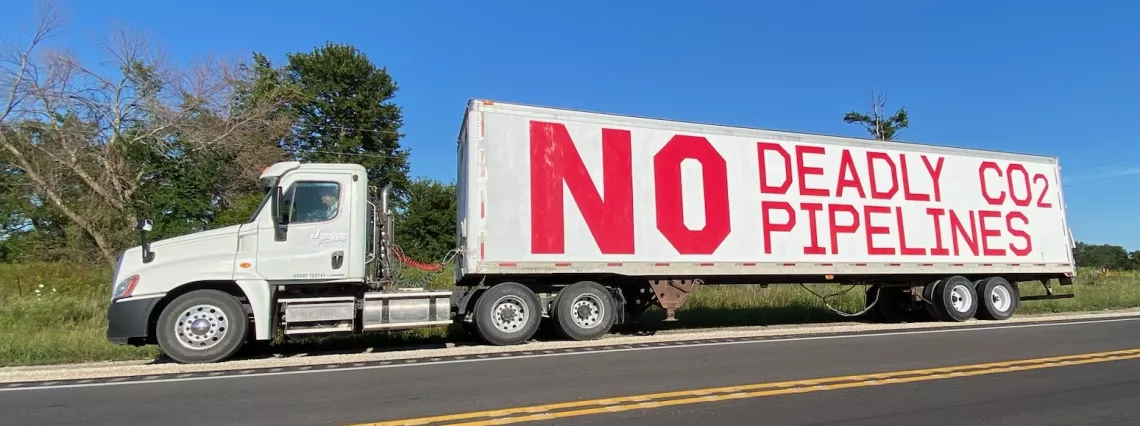
Summit Informational Meetings for its Expansion
Summit is beginning the Iowa Utilities Commission (IUC) process for the expansion routes, which add a number of ethanol plants to the original Summit carbon dioxide footprint.
The first step in the IUC process is holding Informational meetings in every impacted county. Every landowner in the corridor of Summit’s newly proposed expansion route either has received or will receive a notice that they are impacted. We need to make sure they hear the truth about the Summit Carbon Pipeline scam!
The Informational Meetings are open to the public. Members of the IUC and staff from Summit will give information about the project and the public will have an opportunity to ask questions or give comments.
The public comment period is our chance to tell the truth about carbon pipelines and the dangers they pose to our land, our families and our communities. We also need to make sure impacted landowners know they DO NOT have to sign an easement. We went to Summit’s Informational Meetings in 2021 and know that Summit uses these meetings to mislead, give a false sense of security, and pressure landowners to sign easements.
Please mark your calendar for the meetings near you. Wear red and help make sure we expose Summit’s scam for what it really is.
|
County |
Date |
Time |
Location |
Street |
City |
|
Adams |
8/26/24 |
6:00 PM |
Corning Opera House Cultural Center |
800 Davis Ave |
Corning |
|
Montgomery |
8/27/24 |
12:00 PM |
Red Coach Inn |
1200 Senate Ave |
Red Oak |
|
Guthrie |
8/27/24 |
6:00 PM |
Guthrie County Activity Center |
209 State St |
Guthrie Center |
|
Greene |
8/28/24 |
12:00 PM |
Clover Hall |
Greene County Fairgrounds |
Jefferson |
|
Webster |
8/28/24 |
6:00 PM |
Cardiff Center, Fort Frenzy |
3232 First Ave S |
Fort Dodge |
|
Hamilton |
8/29/24 |
12:00 PM |
Jewell Golf Club Banquet Room |
1225 Main St |
Jewell |
|
Hardin |
8/29/24 |
6:00 PM |
Albrights Bluff |
119 Main St |
Iowa Falls |
|
Buchanan |
9/9/24 |
6:00 PM |
Hazleton American Legion |
105 Hayes St. W |
Hazleton |
|
Fayette |
9/10/24 |
12:00 PM |
Oelwein Coliseum |
101 First St. SW |
Oelwein |
|
Bremer |
9/10/24 |
6:00 PM |
The Centre Hall |
1211 Fourth St. SW |
Waverly |
|
Butler |
9/11/24 |
12:00 PM |
Greene Community Center, large room |
202 W South St |
Greene |
|
Floyd |
9/11/24 |
6:00 PM |
Swartzrock Community Center, Floyd County Fairgrounds |
2516 Seven Mile Road |
Charles City |
|
Mitchell |
9/12/24 |
12:00 PM |
South Square |
202 S Washington St |
St Ansgar |
|
Worth |
9/12/24 |
6:00 PM |
Lanterns and Lace |
3586 Orchid Ave |
Manly |
|
Hancock |
9/13/24 |
12:00 PM |
Viaduct Center |
255 US Highway 69 St. |
Garner |
|
Kossuth |
9/16/24 |
6:00 PM |
Eagle Center |
401 Smith St |
Lakota |
|
Palo Alto |
9/17/24 |
12:00 PM |
Iowa Lakes Community College, Half of fourplex |
3200 College Drive |
Emmetsburg |
|
Clay |
9/17/24 |
6:00 PM |
Occasions |
First Ave East |
Spencer |
|
Osceola |
9/18/24 |
12:00 PM |
Melvin American Legion Community Building |
225 State Highway 313, Main St |
Melvin |
|
O'Brien |
9/18/24 |
6:00 PM |
Primghar Community College |
215 First St SE |
Primghar |
|
Sioux |
9/19/24 |
12:00 PM |
Prairie Winds Event Center |
908 Eighth St. SE |
Orange City |
|
Ida |
9/19/24 |
6:00 PM |
Cobblestone Holstein |
2011 Indorf Ave |
Holstein |
|
Buena Vista |
9/20/24 |
12:00 PM |
Cobb Tavern Ballroom |
98 Lakeshore Drive |
Lakeside |

Meeting with Governor about CO2 pipelines
After a number of attempts of trying to meet with the governor about the carbon dioxide pipelines, Jess Mazour finally had an opportunity.
For over 3 years, Sierra Club Iowa Chapter and impacted landowners have been trying to meet with Governor Kim Reynolds to ask her to protect Iowans and our property rights from the Summit and Wolf carbon pipelines. And for three years, Reynolds and her staff have ignored our requests.
Even though Governor Reynolds has been hiding from impacted landowners and the carbon pipeline issue, last week we spotted her at the Iowa State Fair! She was having her picture taken with fair attendees.
Sierra Club Iowa Chapter staff Jess Mazour took up Reynold’s offer to take a picture with. As she was posing, Jess told her to stop stealing Iowa farm land for Summit’s carbon pipeline scam. Reynold’s facial expression changed and she quickly responded, “I have nothing to do with the carbon pipelines.” Mazour reminded the Governor of her two hand-picked appointments to the Iowa Utilities Commission and the purposeful stalling of our eminent domain bill in the Iowa Senate.
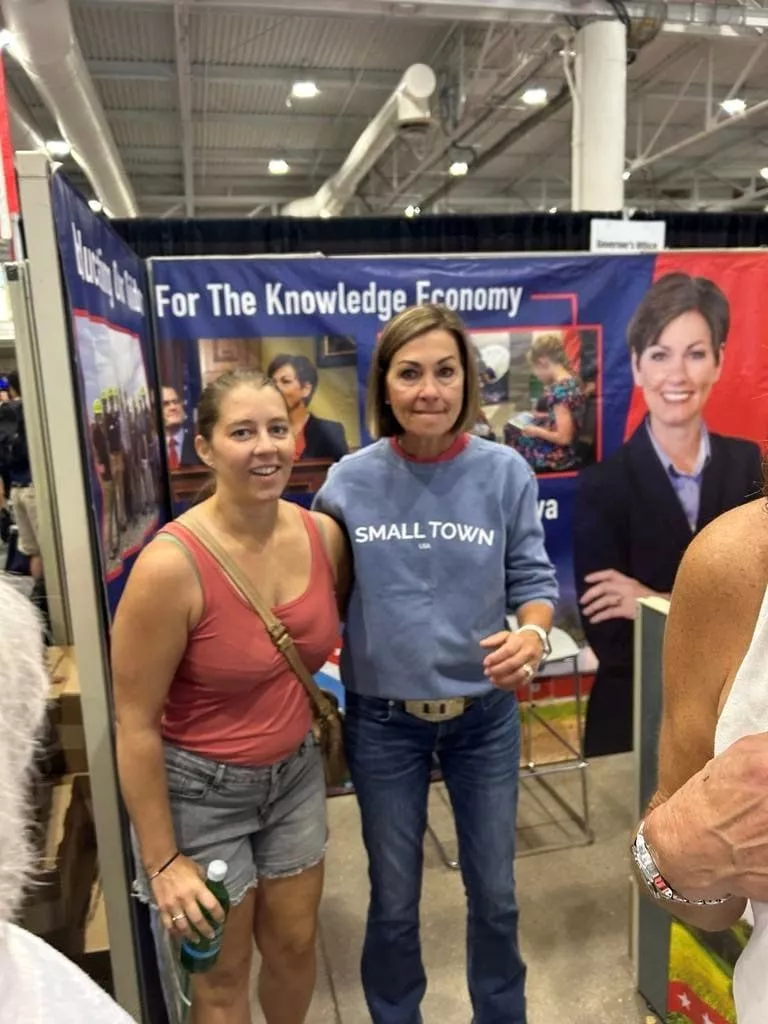
Reynolds' staff quickly ushered Mazour away after her picture was taken.
It is interesting to note that the governor is meeting regularly with Bruce Rastetter, founder of the Summit CO2 pipeline.
Iowa needs a Governor who stands with people over pipelines!
Take Action! Attend Summit’s upcoming informational meetings and speak out against the Summit’s carbon pipeline scam.
RSVP for October 5 – Sierra Club Annual Meeting
The Sierra Club annual meeting will be on October 5, 2024, from 10:00 to 3:30 at the Drake University Olmsted Center, 2875 University St, Des Moines, Iowa. The cost is $40 per person; pay at the door. We hope you can join us. RSVP now.
The schedule for the day is:
10:00 - 10:30 - Arrive and check in
10:30 - Welcome and opening remarks
10:45 -11:45 - Dr. Larry Weber, "Iowa Watershed Approach: A plan for a more resilient Iowa". The State of Iowa recently completed a project entitled the Iowa Watershed Approach focused on improving community resilience to floods, droughts and declining water quality. The presentation will provide a vision for a more resilient Iowa across all sizes of cities, from small rural communities to large urban centers. Larry Weber is the Edwin B. Green Chair in Hydraulics in the Department of Civil and Environmental Engineering and Director of IIHR – Hydroscience and Engineering. He also serves as the interim director of the Iowa Flood Center at the University of Iowa and co-founded the Iowa Nutrient Research Center in partnership with Iowa State University.
11:45 - 12:45 - Lunch, followed by Sierra Club lunch and learn
1:00 - 2:00 - Dr. David Cwiertny, "Understanding the Impact of Iowa's Water Quality on Public Health". David Cwiertny is a Professor of Environmental Engineering and Chemistry at the University of Iowa, where he also directs the state-funded Center for Health Effects of Environmental Contamination. His work at the University sits at the intersection of water quality, public health and public policy, with a particular focus on water quality challenges in Iowa.
2:00 - 3:00 - Mike Owen, "Tax Cuts and Real World Choices: The Threat to Iowa's Future". Tax cuts, as proposed by the legislature, will have huge impacts on environmental protection, parks and recreation areas, and protection of natural resources. Mike Owen is deputy director of Common Good Iowa, a nonpartisan, nonprofit policy research and advocacy organization based in Des Moines. Mike is a former journalist in Iowa and Pennsylvania, and since 2001 has followed that effort to inform and engage Iowans on issues that matter to their daily lives and future, first with the Iowa Policy Project and, since 2020, Common Good Iowa.
3:00 - 3:30 - Open forum and next steps
3:30 - Adjourn
We hope to see you on October 5. RSVP now.

Dedelegation Petition:
The Iowa Chapter Asked the EPA to Withdraw Iowa’s Authority Under the Clean Water Act
The Clean Water Act was passed by Congress in 1972. Its purpose is:
Obviously, those goals have not been met in Iowa, but EPA and the Iowa Department of Natural Resources must keep trying. That is why the Iowa Chapter asked EPA to withdraw Iowa’s authority to administer the Clean Water Act.
Under the Clean Water Act, EPA can delegate to states the authority to administer and enforce the Act. But EPA still retains oversight and the ultimate responsibility to ensure that the Clean Water Act is being administered and enforced correctly. The Sierra Club believes the Iowa DNR is falling down on the job. The areas of concern are the National Pollutant Discharge Elimination System (NPDES) program and failure to meet water quality standards and cleaning up impaired waters.
The first reason for the petition to EPA is that the DNR is not requiring animal feeding operations that discharge pollutants to obtain NPDES permits. The DNR has a history of not requiring confinement operations to obtain NPDES permits. And very few open feedlots have obtained permits. But animal feeding operations do have discharges. If the NPDES program is meant to actually eliminate discharges, animal feeding operations must be required to have permits in order to discharge.
Animal feeding operations are defined by law as point sources and a point source that discharges pollutants must have an NPDES permit. However, almost all animal feeding operations in Iowa claim that they do not discharge, and therefore do not need NPDES permits. Then, when an animal feeding operation does discharge, the owner claims that the cause of the discharge has been remedied and there will be no more discharges. In fact, the DNR has never issued an NPDES permit to a confinement operation.
If an operator of a livestock operation wants to avoid having to obtain an NPDES permit, there must be more than just a promise not to discharge again. There must be some assurance equal to the effectiveness of an NPDES permit that the facility will not discharge and that the assurance is enforceable. The DNR has never required such assurances. Sierra Club believes that all of the animal feeding operations in Iowa that have discharged should have been required to apply for an NPDES permit.
The DNR has seldom levied the maximum $10,000 administrative fine allowed for a discharge, and in some cases, not fine was levied at all. If no NPDES permit is required, the only effective deterrent to discharges from animal feeding operations is a fine sufficient to be more than just a cost of doing business.
The NPDES program also applies to wastewater treatment facilities and industrial facilities. The second reason we asked the EPA to withdraw Iowa’s clean water authority is that many of the permits that have been issued to these facilities have not been renewed for many years. Some of these permits have been expired since 2002. According to DNR records, there are currently 467 facilities operating on expired NPDES permits.
DNR regulations require that an NPDES permit be renewed every 5 years. The purpose of the renewal requirement it to ensure that the permit is based on up-to-date “information on the permittee’s production levels, the permittee’s waste treatment practices, or the nature, contents, and frequency of the permittee’s discharge.” A facility operating on an expired NPDES permit may be discharging pollutants that would violate the requirements of the Clean Water Act. The DNR has made no effort to update and renew these expired permits. This is a violation of the Clean Water Act.
The Clean Water Act requires states to review and adopt water quality standards. The Act then requires states to identify waters that do not meet water quality standards, creating what is called an impaired waters list. For those impaired waters, the state must then establish a total maximum daily load (TMDL) in order for the water to meet water quality standards. The current list contains 577 water segments. Some of these segments has been on the list since 2006 and 2008, with no TMDL having been prepared.
Some of the waters dating back to 2006 and 2008 are designated as Outstanding Iowa Waters. These waters are entitled to extra protection. But DNR has designated them as low priority for preparing TMDLs. This is a clear violation of the intent, if not the specific language, of the Clean Water Act, which says that the priority ranking must be made “taking into account the severity of the pollution and the uses to be made of such waters.” These waters, given their status and their high social impact as trout streams, are not given their proper priority to the scoring system.
Because the Iowa DNR has a history of failing to exercise its responsibility under the Clean Water Act, the Iowa Chapter has asked EPA to step in and withdraw Iowa’s authority to administer the Clean Water Act.
Dead Zone Update
This year’s dead zone in the Gulf of Mexico is approximately 6,705 square miles, which is about the size of New Jersey. [1] The dead zone, also called hypoxic zone, is an area that is so depleted of oxygen that fish and other marine animals are not able to live in the water. Nutrients – nitrogen and phosphorus – are the culprits, beginning a cycle of spurring the growth of algae and leading to a decomposition process that uses the oxygen in the water and leaves less oxygen available for the marine life.
The water in Iowa’s streams and rivers eventually flows into the Mississippi River and the Gulf of Mexico. The water in Iowa’s rivers and streams is laced with nutrients, largely due to runoff from farm fields. Consequently the nitrogen and phosphorus pollution from Iowa’s waters is a direct contributor to the dead zone in the Gulf of Mexico.
The Gulf Hypoxia Action Plan 2008 states that the goal of the national effort to reduce the dead zone in the Gulf of Mexico was to cut the nitrate and phosphorus pollution reaching the Gulf by 45 percent by 2015, with a dead zone of 1,900 square miles. [2] That goal was not met. The goal was changed in 2014 [3] “to reduce the five-year running average areal extent of the Gulf of Mexico hypoxic zone to less than 5,000 square kilometers by the year 2035” with an interim target of a 20% reduction of nitrogen and phosphorus loading by 2025. Note, 5,000 square kilometers is 1930.5 square miles.
2025 will arrive soon. Unfortunately, it appears that the 20% reduction target will not be met. Not only that, but the five-year running average shows that the dead zone is 4,298 square miles [4], far above the goal of 1900 square miles.
Iowa released its draft nutrient reduction strategy in November, 2012. [5] Unfortunately, we have made little progress in reducing Iowa’s contribution to the Dead Zone since then. A major study, released in the spring of 2018, titled “Iowa stream nitrate and the Gulf of Mexico” by Christopher S. Jones, Jacob K. Nielsen, Keith E. Shilling, and Larry J. Weber lays out the contribution Iowa makes to the dead zone in the Gulf of Mexico. To summarize the results of the study:
- Three major watershed basins drain into the Gulf of Mexico – Mississippi-Atchafalaya Basin, Upper Mississippi River Basin, and the Missouri River Basin.
- The hypoxia is driven by nitrogen and nitrates.
- Iowa contributes an average of 29% of the nitrate load to the Upper Mississippi Basin.
- Iowa contributes an average of 45% of the nitrate load to the Missouri River Basin.
- Iowa contributes an average of 55% of the nitrate load to the Mississippi-Atchafalaya Basin.
- Since 1999, nitrate loads in the Iowa-inclusive basins have increased.
- The increases in nitrate loads do not appear to be driven by changes in discharge and cropping intensity unique to Iowa.
- The 5-year running annual average of Iowa nitrate loading has been above the 2003 level for ten consecutive years.
- The goals of reducing the dead zone in the Gulf of Mexico will be very difficult to achieve if nitrate retention cannot be improved in Iowa. [6]
Clearly Iowa is playing an outsized role in contributing to the dead zone in the Gulf of Mexico.
[1] Delaney Dryfoos, “Gulf ‘dead zone’ larger than average this year”, Cedar Rapids Gazette, August 9, 2024
[2] “Mississippi River Gulf of Mexico Watershed Nutrient Task Force New Goal Framework”, December 3, 2014, www.epa.gov/sites/production/files/2015-07/documents/htf-goals-framework-2015.pdf
[3] “Mississippi River Gulf of Mexico Watershed Nutrient Task Force New Goal Framework”, December 3, 2014
[4] Delaney Dryfoos, “Gulf ‘dead zone’ larger than average this year”, Cedar Rapids Gazette, August 9, 2024
[5] See www.nutrientstrategy.iastate.edu/documents
[6] Christopher S. Jones, Jacob K. Nielsen, Keith E. Shilling, and Larry J. Weber, “Iowa stream nitrate and the Gulf of Mexico”, PLOS One, April 12, 2018, abstract. Available at http://journals.plos.org/plosone/article?id=10.1371/journal.pone.0195930
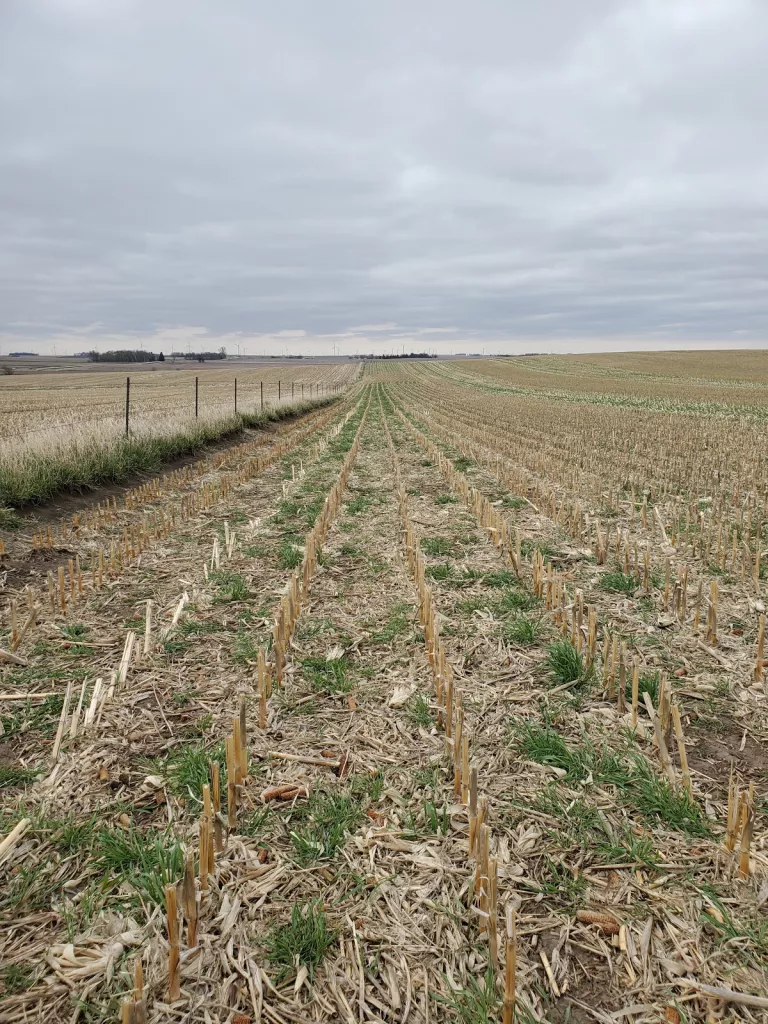
Photo of cover crops growing in a corn field. Photo by Jess Mazour.
Lunch and Learns Fridays at noon
Fridays at noon, we do a Lunch and Learn livestream. See us on Facebook at "Sierra Club Iowa Chapter". These will be recorded so you can watch them anytime. Topics will be selected based on what is happening during the week. During the legislative session, we cover issues coming before the Iowa legislature.
In case you missed our past webinars and lunch and learn sessions, you can still see them.
- Watch "Summit Phase 2 Expansion Informational Meetings", August 9, 2024
- See "Dedelegation Petition and Iowa’s Clean Water", August 2, 2024
- Watch "2 East Nishnabotna River Polluters Fined: Waspy’s Truck Wash & City of Audubon", July 26, 2004
- See "Requests for Reconsideration of Summit's Approval", July 19, 2024
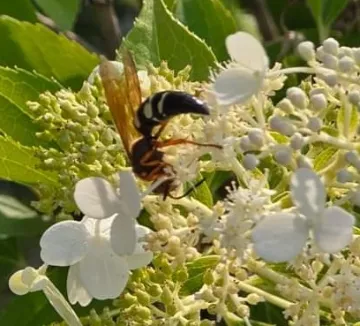
Photo of Eastern Cicada Killer by Nick Graceffa
Volunteer for the Iowa Chapter
Almost everything we do is done by volunteers like you. If you would like to volunteer for the Iowa Chapter, please let us know by sending an E-mail to Iowa.chapter@sierraclub.org. Or sign up by using the online form. There are many opportunities for you to make a difference:
-
making phone calls
-
developing graphics for banners and flyers
-
working on legislative issues
-
working on elections
-
fundraising
-
organizing events
-
joining an issue committee
If you would like to join our legislative action team, sign up here. Keep on top of what is happening at the Iowa legislature. Be alerted when you should contact your legislators about pending legislation.
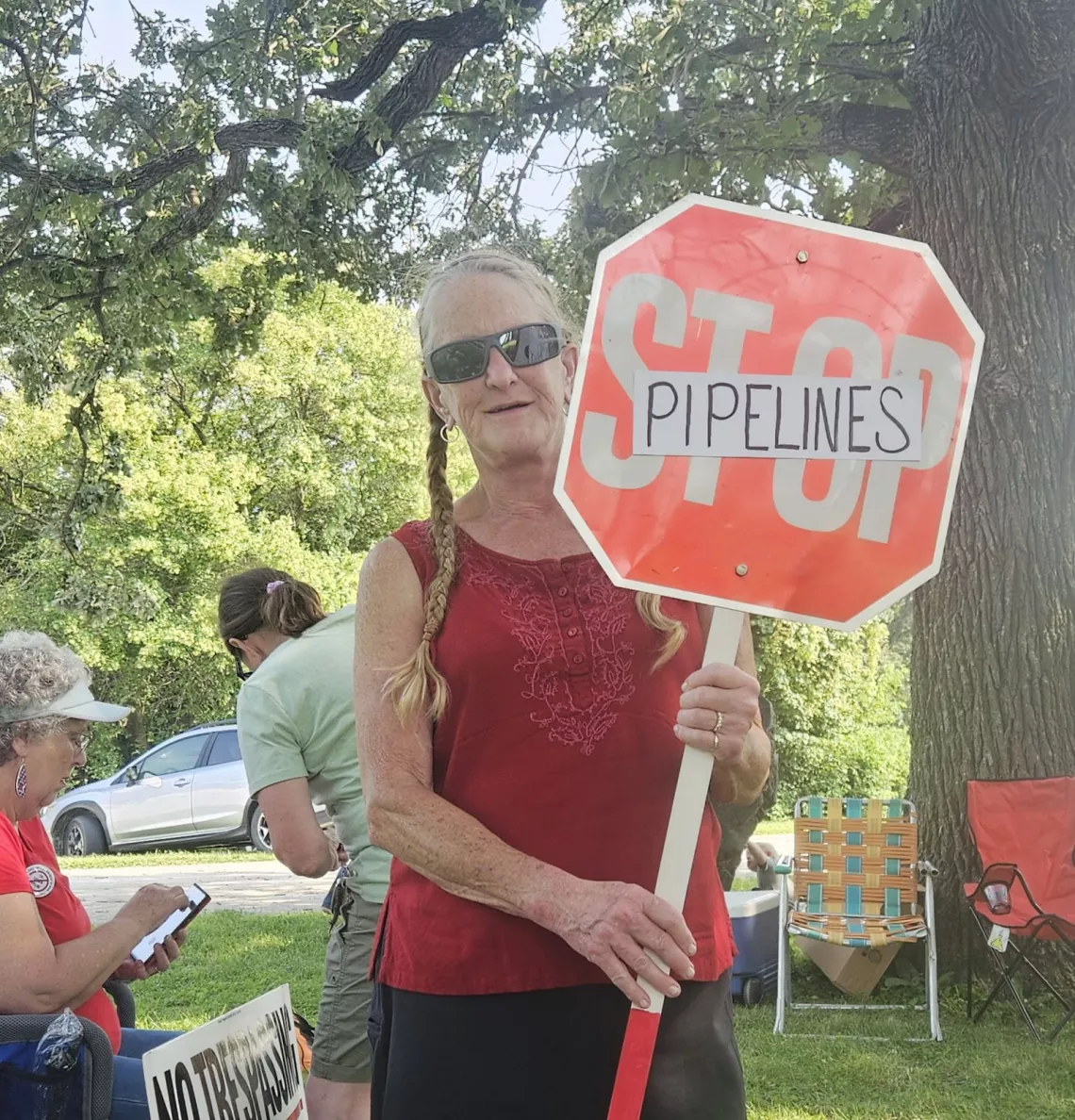
Contribute to the Iowa Chapter
Sierra Club - working every day on Iowa’s environmental problems
Sierra Club is Iowa’s oldest and largest grassroots environmental organization. Not only that, we are the best bet in the state for achieving bold solutions to Iowa’s environmental problems.
We work in the courts, before Iowa’s public agencies, and in the halls of the legislature. The Iowa Chapter's effort to protect the environment takes financial support. The Chapter receives very little financial support from the national Sierra Club. Can we count on you for a donation to ensure even more victories? Your contribution will be put to work here in Iowa on issues that affect every day Iowans – water quality, clean air, protection of Iowa's soil, parks and natural areas, and a strong democracy. The Iowa Chapter is relentless in fighting back bad legislation that affects every one of us.
Your non-deductible contributions make it possible for us to fight bad legislation and to promote good legislation. We appreciate your past and on-going support of these efforts. You can make a non-deductible donation with a credit card. A non-deductible donation supports the Chapter's effective, citizen-based advocacy and lobbying programs. If you prefer, a non-deductible check can be written to the Sierra Club Iowa Chapter and mailed to:
Treasurer
Sierra Club, Iowa Chapter
PO Box 1058
Marion, IA 52302
You can also make a tax-deductible donation with a credit card. Tax-deductible activities are limited to public interest education, research and legal actions. A deductible check can be written to the Sierra Club Foundation with “Iowa Chapter” written in the memo line.
Thank you for your support.
Donate your used vehicle
As the Sierra Club Foundation's Iowa Chapter continues to raise charitable funds to support its work in Iowa, won’t you consider participating in our vehicle donation program? Our partners over at CARS have made the process of donating your unused or unneeded car, truck, motorcycle, boat or RV easy, efficient and secure. They’ll take care of everything from picking up your vehicle to sending you a tax receipt for your generous gift. To learn more about The Sierra Club Foundation's Iowa Chapter vehicle donation program, please call 844-674-3772. Or visit our webpage to get started today!
Sierra Club Foundation promotes climate solutions, conservation, and movement building through a powerful combination of strategic philanthropy and grassroots advocacy. The Foundation is the fiscal sponsor of Sierra Club’s charitable environmental programs.
For more information
Planned giving . . . naming the Sierra Club Iowa Chapter in your will
Ensure your environmental legacy by naming the Iowa Chapter in your will or trust. These gifts cost you nothing now. You can hold onto your assets for as long as you need them.

Thank you for supporting our work!
| When | Earliest: Latest: |
| What |
|
| Word or Phrase | Word or phrase to search for: |
| Leader | All or part of leader name to search for: |
No Matching Activities Found
Loading
| Date | Activity (click title for full description) | Sponsor | Category | Type | Difficulty | Links |
|---|
Loading ...
 Outing
Outing Club support event
Club support event  Social event
Social event  Activist event
Activist event  Multiple events (map only)
Multiple events (map only)